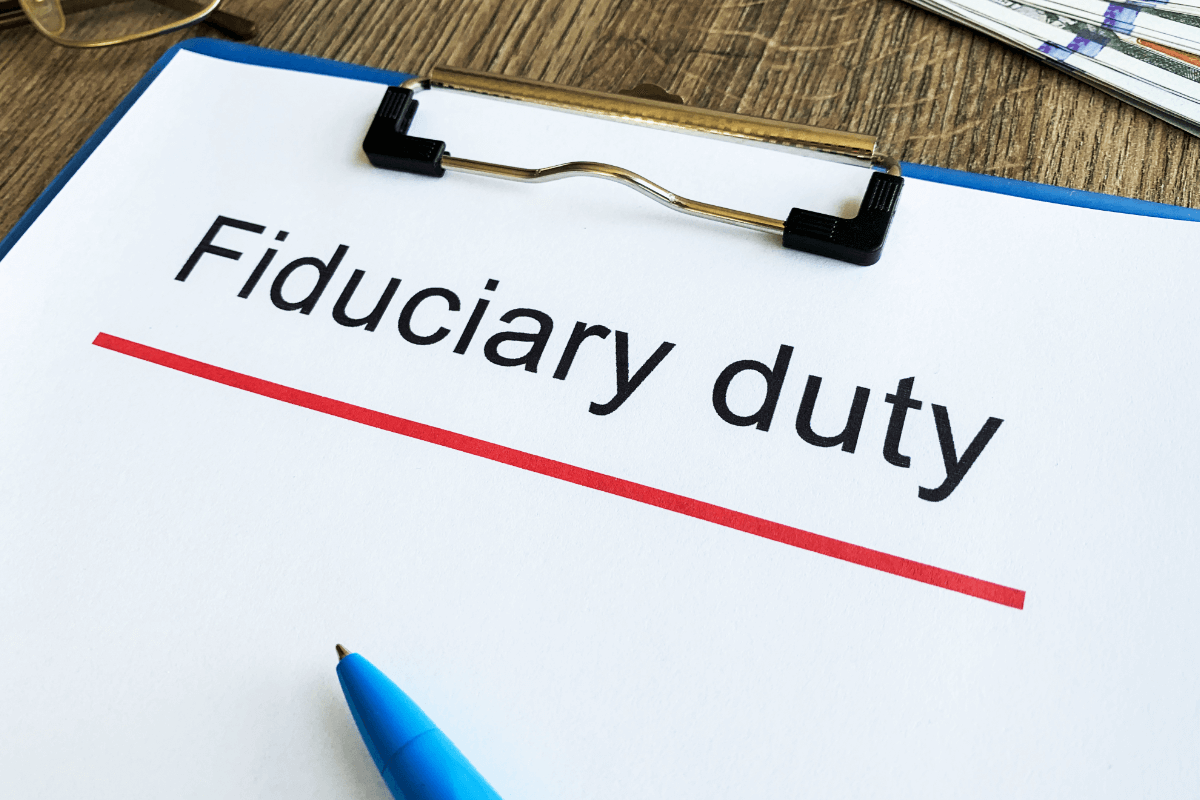
The directors of a corporation owe shareholders a fiduciary duty to act in their best interests. This duty allows shareholders to safely and securely finance a corporation and its business goals while ensuring their capital investment is safe. With a prescribed fiduciary duty, shareholders would be more likely to engage in this commercial activity, providing a corporation the ability to raise capital for growth over time.
Shareholders should be aware of the duties owed to them when purchasing stock in a company.
The following discussion examines the establishment of the fiduciary duty owed to shareholders by the directors of a corporation.
What is a Shareholder?

Because shareholders own a portion of the corporate entity, the shareholder is entitled to certain rights under state and (sometimes) federal law. The directors of the corporation and the appointed officers have a set of responsibilities to act in the shareholder’s best interests.
What is a Fiduciary Duty?
One example of fiduciary duty is the underlying responsibility of the directors and officers of a corporation to act in the best interests of the shareholders. To become a shareholder, the holder of the share typically exchanges something of value to obtain a share of ownership in the company. Once the exchange has been completed, the directors of a corporation must operate the corporation in a way that meets the financial interests of the shareholder. Any deviation from those duties can result in legal action from the shareholders.
Understanding the Basic Structure of a Corporation

Most importantly, it is the role of the Board of Directors to make proper decisions that are in the best interest of the corporate entity and its shareholders. Under Texas Annotated Code § 21.401(a), the Board of Directors exercises or authorizes the corporation’s powers and directs the management of its business and affairs.
Essentially, the board is tasked with establishing a structure for business operations. This includes, but is not limited to:
- Empaneling directors to the board
- Drafting and executing bylaws
- Hiring corporate officers to manage their corporation’s daily affairs
- Addressing the corporation’s outstanding liabilities
- Issuing stock to be purchased by potential shareholders
- Establishing procedures to wind up and dissolve the corporation
Understanding the Duties Owed to Shareholders
As discussed above, directors of a corporation owe a fiduciary duty to shareholders to act in their best interests when making decisions that impact the core mission of the corporation, in most cases to maximize shareholder value by engaging in commercial activity. In some instances, decisions made by directors (hiring a Chief Executive Officer, purchasing new equipment, opening up sales in a new market) may harm the corporation.
Although these decisions may harm shareholder value, it does not necessarily mean an incorrect business decision breaches the director’s fiduciary duty. Instead, a breach of this duty means the director or directors deviated from protecting and serving the best interests of the shareholder–often for personal gain. Below is a breakdown of the responsibilities prescribed to directors in their role as a fiduciary to shareholders.
Duty of Loyalty
Core to all fiduciary duties is the duty to be loyal to shareholders. Directors must act in good faith when making decisions that impact the corporation. This means that directors cannot make decisions that promote their own self-interests or that of third parties over the interests of shareholders – known as “self-dealing.”
A common loyalty issue is that of usurping corporate opportunities. Directors are often the first to be aware of business opportunities available to the corporation. A director may usurp these opportunities by taking advantage of the opportunity themselves or on behalf of another party. This can lead the corporation to miss a business opportunity and be a detriment to shareholder interests.
Duty of Obedience
The duty of obedience (also known as the duty to follow the law) requires directors to obey all local, state, and federal laws regarding the corporation’s administration and to conduct its operations lawfully.
Although the corporation bears the responsibility for certain civil and criminal acts based on its operations, a director may be found personally liable if that director knowingly committed unlawful acts or had direct knowledge of representatives of the corporation committing such acts. This type of conduct can result in a breach, allowing shareholders to pursue civil damages against the directors and seek their termination from the corporation.
Duty of Care
Lastly, directors must maintain a duty of care to meet their fiduciary duties to shareholders. All directors are held to a reasonably prudent person standard in performing their duties. This means that a director must act as a reasonably prudent director would act under similar circumstances.
Directors may shield themselves from liability by adhering to the business judgment rule. Under the rule, a director may not be found liable for mistakes when using their business judgment, even if their mistakes harmed the corporation. They may shield incompetent, negligent, or misinformed directors.
However, if the director’s actions were found to be grossly negligent, fraudulent, illegal, self-dealing, lacking in any judgment, or uninformed with reasonable access to proper information, they may have breached their duty of care.
Compliance with Fiduciary Duties
Directors are required by law to act in the interest of their shareholders. However, even the most lawful, informed, and prudent director is subject to the same scrutiny as any other director. Good shareholders should be mindful of corporations that bear their financial interests. Thus, below is a list of acts or omissions that should raise a red flag for shareholders:
- Directors who are unqualified to perform their essential duties
- Directors who fail to communicate with other directors, officers, and shareholders
- Directors who often miss or fail to participate in regularly scheduled board meetings
- Directors who are unaware of changes in corporate policy or governance
- Directors who fail to supervise subordinates, including appointed officers and other executive-level staff
- Directors that do not review essential business items like bylaws, policies, new contracts, mergers or acquisitions, executive compensation, budgets, and legal issues
- Directors that possess a history of deviating from the wishes of shareholders
Legal Counsel for Fiduciary Duties Issues
Shareholders have a fundamental right to have their investments protected. Thus, a shareholder that has questions about their investment in a corporation or believes a director or an officer of a company holding their investment is not meeting or upholding their fiduciary duty should seek legal counsel.
Please get in touch with a Houston commercial litigation attorney at Berg Plummer Johnson & Raval, LLP today to learn more about your rights as a shareholder.
